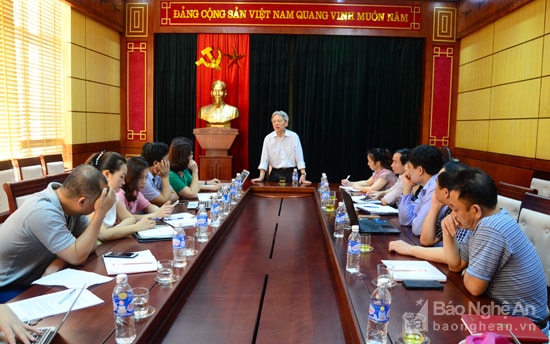Dr. Nguyen Sy Dung: Social networks and the challenges of journalism
(Baonghean.vn) - According to Dr. Nguyen Sy Dung, former Deputy Head of the National Assembly Office, social networks and digital media have helped the press develop in all aspects, but at the same time created a fierce information competition environment, creating challenges for the press.
 |
| Dr. Nguyen Sy Dung - Former Deputy Head of the National Assembly Office talked with officials and reporters of Nghe An Newspaper. Photo: Thanh Le. |
The digital media era, along with social networks, creates huge challenges for journalists. First of all, it is updating information, many events that the press has not reported on yet but social networks have reported on.
The trend of 'citizen journalists' and 'personal newsrooms' is increasingly appearing. In Vietnam, it is estimated that there are about 180 million mobile phones in use, most of which have the functions of taking photos, filming, and accessing the internet. Information is updated on social networks very quickly, making it very difficult for the press to compete in updating information.
| On the morning of April 11, Dr. Nguyen Sy Dung - former Deputy Head of the National Assembly Office had a discussion with officials and reporters of Nghe An Newspaper about the challenges of journalism in the digital media era and building a creative and developing state. Attending the meeting were comrade Pham Thi Hong Toan - Member of the Provincial Party Committee, Party Secretary, Editor-in-Chief of Nghe An Newspaper and officials and reporters of the agency. |
The second challenge is that the press cannot improve labor productivity because the publishing process has to go through many stages and procedures.
Mr. Dung pointed out that the labor productivity of other industries has increased 100 times, but the press, especially print newspapers, has stopped there. That is the reason why print newspapers in developed countries are forced to disband and close down.
To improve labor productivity in the journalism field, especially in the upcoming fourth industrial revolution, is extremely difficult.
So, what is the "way out" for the press? Mr. Dung said that on the one hand, the press must provide information quickly, but what makes the press different from social networks is that it must add added value, reporting honestly, constructively, critically and comprehensively.
From an event on social media, reporters must analyze and add value, analyze the consequences of the event's impact on the public. This is something that social media cannot do. Information on social media, although rich and diverse, is still personal and not reviewed by any editorial board. Not to mention that information on social media is often inaccurate.
 |
| The editorial office center of Nghe An Newspaper. Photo courtesy |
Mr. Dung also affirmed that modern journalism has a close relationship with social networks. In the era of digital media explosion, journalists themselves are also participants in the social network community to access and filter information, and provide information in an honest, constructive and comprehensive manner to the general public.
According to Mr. Dung, to compete with social networks, each newspaper must improve its quality, overcome the trend of commercialization, and constantly improve its technical level and professional expertise in the direction of modernization.
"In particular, we must build our reputation and brand. The newspaper's information is trusted by readers, which is the newspaper's strength. If the press wants to survive and be effective, it must build trust with the public," said Mr. Dung.
Also at the talk with officials and reporters of Nghe An Newspaper, Mr. Nguyen Sy Dung discussed a number of contents related to the topic of a creative and developing state; a number of opportunities and challenges of Nghe An Newspaper in the era of information explosion on social networks...
Thanh Le
| RELATED NEWS |
|---|
